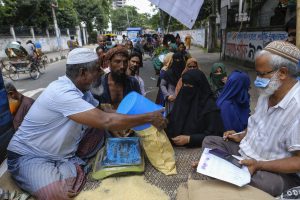On October 8 this year, senior Bangladesh Nationalist Party (BNP) leader Amanullah Aman announced at a public rally in Dhaka that the country would be ruled by the BNP from December 10. “Get ready, a new program will be announced” to blockade all of Bangladesh from Teknaf to Tetulia and Rupsha to Pathuria, he said.
“If necessary, we will be martyrs but no election under [Prime Minister] Sheikh Hasina will be allowed. We will return home after ensuring the removal of this government,” the BNP leader said.
The BNP said it will hold 10 rallies across the country. It has held seven rallies in major cities so far. All the rallies have been peaceful, although the ruling Awami League (AL) sought to disrupt them by shutting down public transport.
It is surprising that large numbers of people have attended the BNP rallies, which did not happen over the last 13 years of AL rule. The final rally will be held in the capital Dhaka on December 10. The rally is of concern to the government, especially in the context of its questionable political legitimacy.
The ruling party has accused the BNP of playing a “game.” AL General Secretary Obaidul Quader said that over the last 13 years the BNP failed to protest for 13 minutes. “BNP leaders failed to bring out a procession for their chairperson Khaleda Zia, [and] now they are dreaming of toppling the government. They are vowing that they will hold a victory march with Khaleda Zia on December 10,” he said. Zia, leader of the BNP, was convicted on corruption charges in 2018 and sentenced to 17 years in prison.
The AL has vowed to remain on the streets to fight back against the challenges posed by the BNP.
AL’s General Secretary of Dhaka city (north) S.M. Mannan Kachi said that the party has started “zone-based programs.” The “anarchies” that the BNP unleashes will be countered by the AL’s programs throughout December, he said.
Describing the BNP as a political party comprising of “killers, terrorists, anti-liberation forces, and anti-humanity forces,” AL leader Abdur Rahman said that “their movement means fire terrorism, killing, and forced disappearance. BNP’s main target is to capture the state power from the back door. They don’t believe in democracy and elections. Their killing mission in the name of politics will be stopped strictly.” The AL will not “spare” them, he warned.
Bangladesh’s two main political parties are heading for a confrontation at the planned December 10 rally in Dhaka. Home Minister Asaduzzaman Khan told the press that Dhaka city has no place or field where two-and-a-half million people can assemble. “Since we are not obstructing political activities, if they organize such a program, they should do so in a place where so many people can stand,” the minister said. This suggests that the government will not allow the BNP to hold the rally in Dhaka city.
BNP members are enthused by the party’s holding of successful rallies over the past month, something they could not do for 13 years. It is the current economic crisis in Bangladesh that has made such a massive mobilization possible.
Inflation is running at over 9 percent as of September 2022. The price of fuel has surged by 50 percent and forex reserves have declined to $26 billion from $48 billion in August 2021.
Bangladesh has sought a $4.5 billion loan from the IMF, and Prime Minister Sheikh Hasina sought oil from Saudi Arabia with payment on a deferred schedule.
Meanwhile, Hasina has called on the Bangladeshi people to be frugal to avert a possible famine. “Utilize every inch of land for food production, we have to go for savings and practice austerity,” she said. Food Minister Sadhan Chandra Majumder said that Bangladesh has “sufficient food stock” and if people avoided hoarding food, a famine could be averted.
The deep economic crisis, lack of transparency on the economic situation, and contradictory statements being issued by state actors have created public distrust in the government. The depth of distrust became evident when Bangladesh Bank had to issue an urgent statement certifying that banks in the country are not facing a liquidity crisis.
Drawing attention to “conspiratorial” reports on social media, the Bangladesh Bank said in a statement that the country’s banking system is in a “strong position,” stressing that there “is no liquidity crisis in the banking system.”
Even as public distrust in the government is growing, Bangladesh’s development partners – the United States, Japan, Germany, and the European Union – are putting pressure on the government to hold free, fair, and inclusive elections. Some of these countries are also raising questions about the legitimacy of previous elections held under the AL government.
Japan’s ambassador to Bangladesh, Ito Naoki, said recently that “police officials were stuffing ballot boxes on the eve” of voting in the 2018 general election. The 2021 U.S. Human Rights report too questioned the validity of the 2018 election.
Such diplomatic pressure has also boosted the opposition.
Meanwhile, on November 16, a Dhaka district court ordered the Jatio Party Chairman G M Quader to refrain from political activity. A leading Dhaka-based political analyst told The Diplomat that “the verdict was politically motivated as Quader has been talking about the economic crisis,” which is damaging the government’s image.
These developments indicate that Bangladesh’s political scenario is getting complex ahead of the 12th general election to be held in December 2023.
The upcoming December 10 rally has become a matter of concern for the ruling party in this context.

































